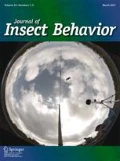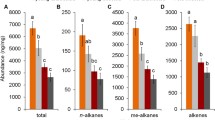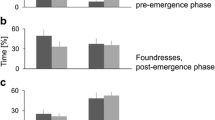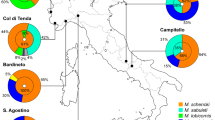Abstract
Host attachment is a necessary behavior in the evolution of parasitism. It is hypothesized that populations pass through a stage of facultative parasitism before the evolution of obligate parasitism. Previous research has revealed the impact of extrinsic factors on the expression of parasitic tendencies, but to our knowledge, the role of individual behavioral variation driving parasitic tendencies remains to be tested. Here, we used repeated behavioral assays to quantify attachment propensity and activity level of individual Macrocheles muscaedomesticae, facultatively parasitic mites of flies, from two different populations. Mites from both populations exhibited repeatability in attachment propensity and mites from one population exhibited repeatability in activity level. We did not find a relationship between an individual’s activity level and attachment propensity. Our data suggest that facultative parasitism may not simply describe a phenotypically plastic strategy that responds to environmental cues, but perhaps that individual differences in parasitic tendencies may appear like facultative parasitism at the population or species level.


Similar content being viewed by others
References
Abo-Taka M, Heikal H, Abd El-Raheem A (2014) Macrochelid mite, Macrocheles muscaedomesticae (Acarina: Macrochelidae) as a biological control agent against house fly, Musca domestica (Diptera: Muscidae) in Egypt. Int J Zool Res 10:30–36
Bartlow AW, Villa SM, Thompson MW, Bush SE (2016) Walk or ride? Phoretic behaviour of amblyceran and ischnoceran lice. Int J Parasitol 46:221–227
Bell AM, Hankison SJ, Laskowski KL (2009) The repeatability of behaviour: a meta-analysis. Anim Behav 77:771–783
Bengston SE, Pruitt JN, Riechert SE (2014) Differences in environmental enrichment generate contrasting behavioural syndromes in a basal spider lineage. Anim Behav 93:105–110
Coleman K, Wilson D (1998) Shyness and boldness in pumpkinseed sunfish: individual differences are context-specific. Anim Behav 56:927–936
Dingemanse NJ, Reale D (2005) Natural selection and animal personality. Behavior 142:1165–1190
Durkin ES, Luong LT (2018) Experimental evolution of infectious behaviour in a facultative ectoparasite. J Evol Biol 31:362–370
Durkin ES, Luong LT (2019) Phenotypic plasticity more essential to maintaining variation in host-attachment behaviour than evolutionary trade-offs in a facultatively parasitic mite. Parasitology 146:1289–1295
Durkin ES, Proctor H, Luong LT (2019) Life history of Macrocheles muscaedomesticae (Parasitiformes: Macrochelidae): new insights on life history and evidence of facultative parasitism on Drosophila. Exp Appl Acarol 79:309–321
Hothorn T, Hornik K, Van De Wiel MA, Zeileis A (2006) A lego system for conditional inference. Am Stat 60:257–263
Jalil M, Rodriguez JG (1970) Studies of behavior of Macrocheles muscaedomesticae (Acarina: Macrochelidae) with emphasis on its attraction to the house fly. Ann Entomol Soc Am 63:738–744
Kralj-Fišer S, Schuett W (2014) Studying personality variation in invertebrates: why bother? Anim Behav 91:41–52
Krantz GW (1998) Reflections on the biology, morphology and ecology of the Macrochelidae. Exp Appl Acarol 22:125–137
Luong LT, Mathot KJ (2019) Facultative parasites as evolutionary stepping-stones towards parasitic lifestyles. Biol Lett 15:20190058
Luong LT, Penoni LR, Horn CJ, Polak M (2015) Physical and physiological costs of ectoparasitic mites on host flight endurance. Ecol Entomol 40:518–524
Luong LT, Brophy T, Stolz E, Chan SJ (2017) State-dependent parasitism by a facultative parasite of fruit flies. Parasitology 144:1468–1475
Mather JA, Logue DM (2013) The bold and the spineless invertebrate personalities. In: Carere C, Maestripieri D (eds) Animal personalities: behavior, physiology, and evolution. University of Chicago Press, Chicago, pp 12–35
Nakagawa S, Schielzeth H (2010) Repeatability for Gaussian and non-Gaussian data: a practical guide for biologists. Biol Rev 85:935–956
Polak M (1996) Ectoparasitic effects on host survival and reproduction: the Drosophila-Macrocheles association. Ecology 77:1379–1389
Poulin R (2007) Evolutionary ecology of parasites. Princeton University Press, Princeton
Price PW (1980) Evolutionary biology of parasites. Princeton University Press, Princeton
R Core Team (2018) R: a language and environment for statistical computing. R Foundation for Statistical Computing, Vienna
Sih A, Bell A, Johnson JC (2004) Behavioral syndromes: an ecological and evolutionary overview. Trends Ecol Evol 19:372–378
Sih A, Cote J, Evans M, Fogarty S, Pruitt J (2012) Ecological implications of behavioural syndromes. Ecol Lett 15:278–289
Sinervo B, Lively CM (1996) The rock-paper-scissors game and the evolution of alternative male strategies. Nature 380:240–243
Stasiuk SJ, Scott MJ, Grant WN (2012) Developmental plasticity and the evolution of parasitism in an unusual nematode, Parastrongyloides trichosuri. EvoDevo 3:1–14
Stoffel MA, Nakagawa S, Schielzeth H (2017) rptR: repeatability estimation and variance decomposition by generalized linear mixed-effects models. Methods Ecol Evol 8:1639–1644
Wade CF, Rodriguez JG (1961) Life history of Macrocheles muscaedomesticae (Acarina: Macrochelidae), a predator of the house fly. Ann Ent Soc Amer 54:776–781
Witsenburg F, Schürch R, Otti O, Heg D (2010) Behavioural types and ecological effects in a natural population of the cooperative cichlid Neolamprologus pulcher. Anim Behav 80:757–767
Acknowledgments
We thank Chelsea Gerena and Jade Chappa for their help with activity assays.
Author information
Authors and Affiliations
Contributions
ESD and CNK contributed to the study conception and design. Material preparation and data collection were performed by ESD. AMR performed data analyses and wrote the statistical methods and results sections. The first draft of the manuscript was written by ESD and all authors commented on and edited previous versions of the manuscript. The raw data associated with this manuscript are available at https://figshare.com/articles/Data_from_Durkin_et_al_2020_-_JoIB_xlsx/11879832. All authors read and approved the final manuscript.
Corresponding author
Additional information
Publisher’s note
Springer Nature remains neutral with regard to jurisdictional claims in published maps and institutional affiliations.
Rights and permissions
About this article
Cite this article
Durkin, E.S., Roth, A.M. & Keiser, C.N. Parasitic Personalities: Consistent Individual Differences in Behavior in a Facultatively Parasitic Mite. J Insect Behav 33, 14–19 (2020). https://doi.org/10.1007/s10905-020-09741-1
Received:
Revised:
Accepted:
Published:
Issue Date:
DOI: https://doi.org/10.1007/s10905-020-09741-1




